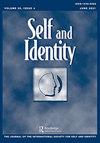真正的自我引导理论在五个国家得到认可
IF 2.1
4区 心理学
Q3 PSYCHOLOGY, SOCIAL
引用次数: 2
摘要
摘要:在美国,一种广泛存在的外行理论认为,做决定的最佳方式是遵循你的“真实自我”,即决策的“真正自我指导”外行理论。在这篇论文中,我们探讨了来自四个不那么奇怪的国家(即西方国家、受过教育的国家、工业化国家、富裕国家和民主国家)的人是否也明确支持TSAG谎言理论,横向/纵向个人主义/集体主义心态的个体差异是否与TSAG认可相关,以及TSAG认可是否预测幸福感。参与者来自美国、中国、印度、新加坡和韩国(共654人)。结果显示,TSAG谎言理论在所有国家都很高,横向心态与TSAG认可比个人主义/集体主义更相关,TSAG认可预测了非美国背景下的幸福感。本文章由计算机程序翻译,如有差异,请以英文原文为准。
True-self-as-guide lay theory endorsement across five countries
ABSTRACT A widespread lay theory in the United States suggests that the best way to make decisions is to follow who you “really are”, referred to as the “true-self-as-guide” (TSAG) lay theory of decision making. In this paper, we explore whether people from four less-WEIRD (i.e., Western, Educated, Industrialized, Rich, and Democratic) countries also explicitly endorse the TSAG lay theory, whether individual differences in horizontal/vertical individualist/collectivist mindsets correlate with TSAG endorsement, and whether TSAG endorsement predicts wellbeing. Participants were recruited from US, China, India, Singapore, and South Korea (total N=654). Results revealed TSAG lay theories was high across all countries, that horizontal mindsets were more relevant to TSAG endorsement than individualism/collectivism, and that TSAG endorsement predicted well-being in a non US-context.
求助全文
通过发布文献求助,成功后即可免费获取论文全文。
去求助
来源期刊

Self and Identity
PSYCHOLOGY, SOCIAL-
CiteScore
5.10
自引率
5.00%
发文量
26
期刊介绍:
Work on self and identity has a special place in the study of human nature, as self-concerns are arguably at the center of individuals" striving for well-being and for making sense of one"s life. Life goals develop and are influenced by one"s view of what one is like, the way one would ideally like to be (or would like to avoid being), as well as one"s perceptions of what is feasible. Furthermore, conceptions of self and the world affect how one"s progress towards these goals is monitored, evaluated, redirected, re-evaluated, and pursued again. Thus, the “self” as a construct has far-reaching implications for behavior, self-esteem, motivation, experience of emotions and the world more broadly, and hence for interpersonal relationships, society, and culture.
 求助内容:
求助内容: 应助结果提醒方式:
应助结果提醒方式:


